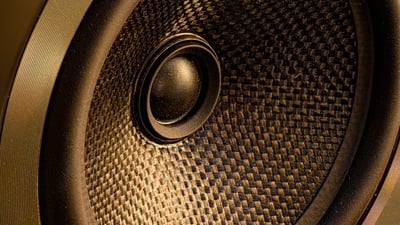Sound Design Mythbuster: Are Bigger Speaker Drivers Better?
Note: This blog from 2021 was updated in 2023 with more information on improving the performance of small speakers.
it comes to speaker size–we’re talking about the transducers that convert an audio signal into mechanical energy, not the enclosures–the common assumption is that bigger is better. If you've got the space, why not have a bigger speaker? After all, larger speakers can make louder sounds, and louder is always better, right? The short answer is "no"–because bigger speakers are not always better when it comes to sound system design, even when you need them to get loud. The long answer is a bit more complicated.
Are Bigger Speakers Louder?
Generally speaking, the larger a speaker is, the louder and lower sounds it can produce. But why? It's all about air displacement.
Bigger speakers move more air and can potentially create more sound pressure, which results in a louder sound. But that’s not the entire story. Sound pressure level (SPL) is measured in a speaker in decibels (dB).
We are interested in two main specifications: the maximum SPL a speaker can produce and the speaker’s sensitivity over a given frequency band. Max SPL means that at some point more power (Watts) into a speaker will not result in more SPL. Sensitivity, on the other hand, is a measure of how much SPL a speaker can produce given the power (Watts) input.
It’s more like an efficiency rating. So, a 5” speaker may be able to produce 90 dB SPL over a range from 200 – 10,000 Hz, but an 8” speaker may only be able to produce 87dB over that same range.
Why? Because often bigger speakers are designed to play lower. That requires more moving mass, and more mass requires more force to move it. Remember high school science class? F=MA (Newton’s second law of motion for those of you who stayed awake) means that as the mass increases, the force (amplifier power in this case) needs to as well or we lose “A” (acceleration)–which gets us back to our sensitivity. So, if your application needs more sensitivity between 200 – 10kHz, and you do not have much amp power, you may be better off with a 5” speaker than an 8”.
Pro tip: Consider bi-amping your system for optimal performance.
Do I Need a Bigger Speaker in Low Frequency Applications?
What about subwoofers and low frequency applications? If space is not a problem, bigger is generally better. But again, not always. Woofers require some sort of enclosure. If the enclosure is limited in size because of space or cosmetic considerations (maybe the space you’re putting your sub into, like a casino gaming unit or small living room, has limitations), then the enclosure may actually dictate the optimal size driver is smaller.
Why? Back to high school science class, this time to talk about compression springs. The air inside a speaker enclosure acts like a pneumatic spring. The smaller the box, the less air inside and the stiffer the spring. A bigger speaker needs more air in the box–a softer spring–for it to achieve low frequencies - unless you build a lot of moving mass into it, but then we are back to Newton’s second law. So, in a smaller speaker enclosure, the smaller speaker may play lower AND louder than a bigger speaker in that same enclosure. As a practical matter, it usually happens within the next speaker size down (a 6” woofer may work better than an 8” woofer or an 8” woofer may work better than a 10” woofer).
How Do I Know I'm Getting the Speakers I Need?
You can use the information above to make general choices about what size of speaker is best for your application, but to be completely sure, talk to a driver manufacturer. They specialize in understanding the size tradeoffs and know how to help you optimize for performance, space, and of course, cost. And, sometimes early assumptions about what is needed don't always line up with the best end solution.
Whether you have a basic spec sheet or detailed designs, a manufacturer or qualified representative can guide you through the process of creating a loudspeaker solution, helping you understand the tradeoffs and decisions that need to be made to get the right speaker. When starting with your goals and budget in mind, an expert can find solutions that engineers and project managers might not have considered to save money, avoid issues, and deliver a speaker solution that's perfect for the application.

